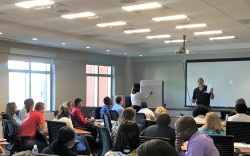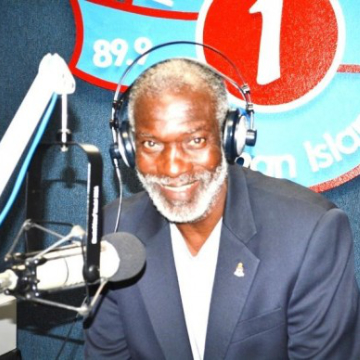News
PAHO Workshop Leads to Climate Change Policy Addition

Following a recent workshop on the subject local public and private stakeholders are set to collaborate on a special climate change and health chapter to go into the draft National Climate Change Policy.
Around 50 people from public sector agencies, the private sector and professional bodies had attended the two-day session on protecting populations of small island developing states, like the Cayman Islands, from the anticipated impacts of climate change on health and health systems. It was organised by the Pan American Health Organisation/World Health Organisation and the Ministry responsible for Health.
Outlining the motivation behind the global training and outreach initiative that began in 2017, PAHO Consultant for Family, Health Promotion and the Life Course Nasolo Thompson remarked: “Our vision is that, by 2030, all small island developing states will have health systems resilient to climate change. In addition countries around the world will reduce their carbon emissions to protect the most vulnerable from climate risks, and to deliver large-scale health benefits in carbon-emitting countries.”
To achieve these goals PAHO/WHO representatives said the health sector must also reduce its carbon footprint, including making health care facilities more resilient to disasters and environmentally friendly. They also noted the many mitigating actions being taken by other sectors which also benefit health.
Ms Thompson along with colleagues, Senior Advisor, Water, Sanitation and Environmental Health for the Caribbean, Adrianus Vlugman and Advisor, Global Environmental Changes, Dr Daniel Buss, led sessions on a range of issues.
Avalon Porter of the National Weather Service presented on the impact of climate change on the Cayman Islands’ weather patterns. Meanwhile Deputy Chief Officer of the Ministry responsible for Health and Environment, Nancy Barnard, gave an overview of presentations at a recent Caribbean workshop on climate change and health in Grenada. Ms Barnard is the Focal Point for Climate Change and Health for the Cayman Islands.
Other topics on the agenda included: the impact of climate change on environmental determinants of health, building climate resilient health systems, the Action Plan on Health and Climate Change for the Caribbean, and the importance of an inter-sectoral approach to climate change.
Speaking at the event Health and Environment Minister Hon. Dwayne Seymour commented that rising temperatures and related catastrophes of recent years as evidence of the need for continuing the multi-sectoral action that marked the creation of the draft policy.
“I would like to take this opportunity to thank PAHO/WHO for funding and organising the event with my Ministry staff, in order to enhance the role of the health sector and key stakeholders in mitigating and adapting to climate change,” the Minister stated.
Workshop participants were drawn from across Government ministries and departments, including the Cabinet Office, as well as the Health Services Authority, Public Health, the Mosquito Research and Control Unit, the Department of Agriculture, the Department of Environment, the Department of Environmental Health, Hazard Management, Water Authority and Port Authority.
Also present were the health sector’s professional councils, the Red Cross, the Chamber of Commerce, CUC, Health City, Doctors’ Hospital, the Cancer Society, the Tourism Association and St Matthews University, among others.












